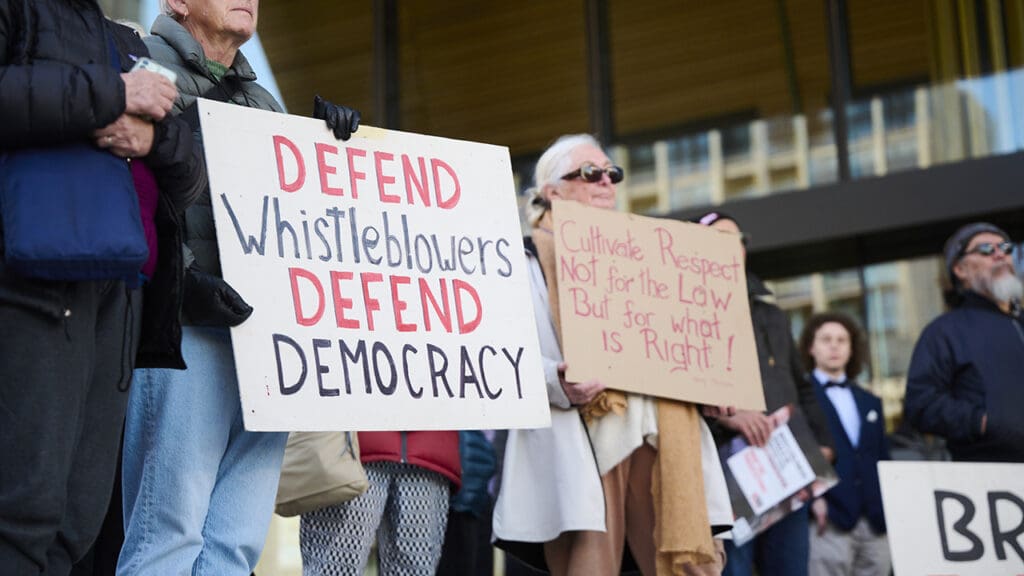Sweeping secrecy laws are bad for democracy. Here’s our chance for reform
OPINION | This piece was originally published by the Canberra Times.
On Thursday, as Julian Assange’s representatives were at Parliament House following the publisher’s long-overdue return home, another matter of secrecy, transparency and press freedom came before Parliament.
In a 314-page report tabled in the House of Representatives, the Independent National Security Legislation Monitor outlined significant concerns about the state of Australia’s secrecy laws and their impact on democracy and the rule of law.
The monitor’s report is timely – and not just for the Assange coincidence. In recent years, journalists and whistleblowers in Australia have been under attack.
Since being charged in 2018, intelligence whistleblower Witness K and his lawyer Bernard Collaery were dragged through the courts for exposing Australia’s heinous wrongdoing against our neighbours Timor-Leste.
In 2019 the offices of the ABC, and the home of News Corp journalist Annika Smethurst, were raided in consecutive days by the Australian Federal Police.
The ABC raid was sparked by the broadcaster’s landmark Afghan Files reporting on war crimes committed by Australian forces in Afghanistan – last month former military lawyer David McBride was sentenced to almost six years’ imprisonment for leaking documents which formed the basis for this series.
And just last week, Tax Office whistleblower Richard Boyle lost his appeal for immunity under federal whistleblowing law. He will face trial in September – despite his whistleblowing being vindicated by numerous inquiries and reviews.
Collectively, these cases have raised serious concerns about whether Australian law currently strikes the right balance between secrecy and transparency.
Those anxieties are only heightened given the inadequacies in Australia’s whistleblowing framework (shortcomings which the present government readily concedes), the lack of robust press freedom protections, concerns about the health of open justice (brought to the fore by the Witness J secret trial and amplified by secrecy in the Collaery and McBride prosecutions), and wider transparency failings – epitomised by our broken freedom of information system.
To top it all off, because Australia is unique among comparable liberal democracies in having no constitutional or statutory national human rights framework, there is no backstop when unnecessary and disproportionate laws intrude on human rights.
The monitor’s review is therefore significant. Last year, a review by the Attorney-General’s Department found almost 1000 secrecy offences and non-disclosure obligations under federal law. It recommended harmonisation and reform.
The monitor’s review is at once narrower and broader – although the review’s focus is only on the general secrecy offences in the criminal code, its recommendations go further in underscoring the shortcomings in the regime.
“There are problems with the current offences, and these need to be addressed,” the report says.
Key recommendations include tightening the scope of offences, abolishing an offence that criminalises third parties like journalists and civil society groups for the mere receipt of information, winding back overly harsh penalties, improving the nature of the journalism defence and ensuring appropriate checks and balances for any prosecutions under the secrecy regime.
It is apt that the last two major independent review of Australia’s secrecy laws, the Australian Law Reform Commission’s 2010 review into secrecy and open government, and now the monitor’s review, begin with the same epigraph. Both commence with a quote by the late Justice Paul Finn, from when the academic and judge was on the Federal Court.
“Official secrecy has a necessary and proper province in our system of government,” Finn wrote. “A surfeit of secrecy does not.”
Finn’s observation was delivered in 2003 in the Bennett case as he invalidated a secrecy obligation on public servants not to “disclose, directly or indirectly, any information about public business or anything of which the employee has official knowledge.”
It was a sweeping secrecy obligation that limited the public commentary of government employee.
For Peter Bennett, who was both a customs official and head of the relevant union, the non-disclosure provision was being used to silence his union-related commentary about changes within customs.
Bennett challenged the validity of the provision, and won. Justice Finn ruled such a sweeping, blanket provision was not compliant with the implied constitutional freedom of political communication.
Public servants cannot be,” Finn said, “silent members of society.”
While the judge recognised that properly calibrated limitations on government information may be appropriate, this regulation went too far.
“The dimensions of the control it imposes impedes quite unreasonably the possible flow of information to the community – information which, without possibly prejudicing the interests of the Commonwealth, could only serve to enlarge the public’s knowledge and understanding of the operation, practices and policies of executive government,” he added.
The judgment in Bennett was a highwater mark in recognising the critical interests of transparency and accountability in Australian democracy.
But as Finn’s cited quote accepts, official secrecy is an important part of government. This is the paradox of secrecy in a democracy – despite our political system being government of the people, by the people, for the people, we must keep certain things secret from the people. National security is one such common rationale; few would suggest that our intelligence services cannot keep secrets.
But a balance must be struck.
Where we do we draw the line? How do we ensure our governments do not deploy secrecy for secrecy’s sake, or insist on opacity only to avoid embarrassment and discomfort?
How can we properly calibrate secrecy and transparency in our democracy?
That is the heart of the challenge encapsulated by Finn.
Unfortunately, we are a long way from that balance in Australia today. The benefit of the Bennett case was eroded by the High Court in Banjeri, a case involving a public servant and their tweets. The Turnbull government in 2018 enacted draconian new secrecy laws. Our public sector whistleblowers laws have not been substantively updated since they were introduced in 2013 (amendments made last year were largely minor and technical), while Labor’s position on establishing a federal whistleblower protection agency is unclear.
Freedom-of-information requests remain beset by delays and denials. The push by civil society and media organisations for stronger press freedom protections following the 2019 raids remains, as yet, unrequited.
It is in this context that the monitor delivered its review. The report is important – it articulates numerous concerns with Australia’s general secrecy offences, and calls for change. The review’s limited focus means it is not a panacea for our nation’s secrecy woes.
But if enacted, the monitor’s 15 recommendations will have a significant impact on transparency in Australia. The Albanese government should commit to implementing the review’s finding as a matter of urgency – together with other reforms that are as yet undelivered.
Sweeping, unnecessary and disproportionate secrecy laws are bad for democracy. Not only do they prevent the public having a proper understanding of what is done in their name, but they allow wrongdoing to go unchecked.
When we appeared before the monitor’s review, we gave the example of robodebt. Whistleblowers spoke up about the unlawful and immoral scheme from the beginning, but they were ignored. If their calls had been heeded, the scheme could have been stopped at the start.
To avoid the next robobdebt, to ensure good government in the interests of all Australians, we need to strike the right balance between secrecy and transparency.
The monitor’s review this week is an important step along that road. The government must act.
Kieran Pender works in the Democratic Freedoms team at the Human Rights Law Centre. You can learn more about the team’s work here.

ADF whistleblower breaks 15-year silence on sexual abuse cover-up
Former RAAF airwoman Julia Delaforce represented by the Human Rights Law Centre, has broken her fifteen year silence on alleged wrongdoing and sexual abuse which was covered up by the Australian Defence Force.
Read more
What issue unites Coalition, Labor, Green, teal and One Nation voters? Whistleblower protections
The Albanese Government’s persecution of whistleblowers Richard Boyle and David McBride is unjust, and the public doesn’t support it. It’s time for much-needed reform.
Read more
We’re fighting Tasmania’s parole board gag on free speech
We have filed legal proceedings on behalf of Tasmanian grandmother, Susan Neill-Fraser. Her case challenges a restrictive parole condition placed on her by the Parole Board of Tasmania which limits her ability to speak to the media.
Read more




